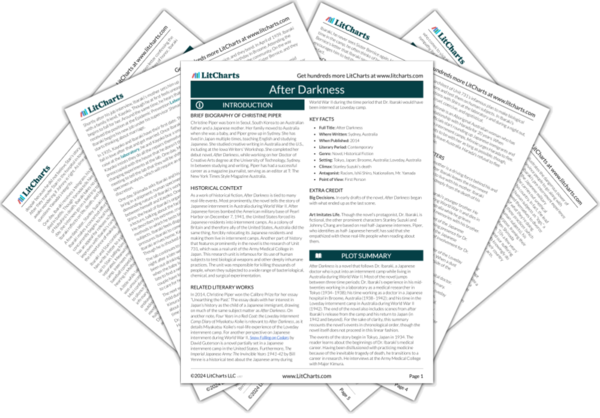In After Darkness, Christine Piper showcases the potential for nationalism to contribute to the dehumanization of a society’s minority groups. In the novel, which is based on real events during World War II, both the Japanese military power and the Australian military power enact this kind dehumanization and justify it with vague notions of nationalism and duty. Perhaps the most prominent example of dehumanization in the novel is the experience of Dr. Ibaraki and his fellow Japanese internees in the Australian internment camp. Though the internees attempt to form a rewarding and rich society through the election of officials (Mayor Mori) and the baseball league, their subpar living conditions and the mere fact of their internment due to their Japanese heritage make their dehumanization undeniable. When Ibaraki’s camp takes a trip to the river in matching uniforms, Ibaraki feels like “a carbon copy of an internee,” stripped of his individuality.
However, the novel also illustrates the dangerous power of nationalist ideologies to convince people to go along with deeply inhumane behavior. Ibaraki’s pre-internment experience in the medical department of the Japanese military demonstrates this dynamic, as he carries out unethical research in the name of serving his country. In fact, the lead researchers literally refer to their human subjects as “logs,” a clear indication that they have allowed themselves to divorce themselves from the horrific reality of what they’re doing. When Ibaraki shows skepticism about these practices (which involve testing biological weapons on human subjects), his superiors insist that such cruelty has a purpose, framing their morbid work as a sort of patriotic duty. When Shimada terminates Ibaraki from the lab, he tells him, “[I]n a few years’ time, we’ll be ruling over Greater East Asia, and our suffering will be rewarded.” The fact that these scientists knowingly do evil things for the sake of an abstract hope for their country shows the power of nationalism to justify horrific acts.
The Dangers of Nationalism ThemeTracker

The Dangers of Nationalism Quotes in After Darkness
The doctor’s long fingers prodded me with surprising force while he dictated the condition of my lungs, heart, hair, teeth, and genitals to his assistant in a voice louder than seemed necessary. He met my gaze only once, when I mentioned that I was a physician, too.
All at once it became clear: this was part of Johnny’s plan to create havoc at camp. Due to jealousy or some personal vendetta, Johnny wanted to bring down the leaders of our compound, and he had somehow convinced Stan that Yamada was to blame for his attack. For all I knew, Stan might have inflicted the wound on himself.
I was struck by the ingenuity of the [mallee] tree in its ability to regenerate and create a new shape better suited for its environment.
Gazing at the mallee trees as we walked to the river, I once more admired their inconspicuous quality [….] Taking a wider perspective, I realized that every element of the landscape […] seemed at pains not to outdo the others, and it struck me as a very noble quality indeed.
“The true purpose of the facility is concealed from the local community through the disguise of a lumber mill. We’ve even started calling our test subjects maruta. It started as a joke, but ‘logs’ has turned out to be a convenient euphemism, so we have persisted with the term.”
“A great doctor, just like a great military commander, knows that sometimes a few lives have to be sacrificed to save thousands of others. When this war is over, great doctors will be remembered.”
Sister Bernice gazed at me. “Don’t you realise what this means? We’re at war with Japan now. You mustn’t stay here. It isn’t safe.” Perhaps mistaking my silence for shock, she continued to speak. “They’ll come for you—they’ll put you away. You should have left a long time ago.”
Her face was creased in anguish. I felt a great tenderness towards her at that moment. “Thank you for your concern, Sister, but you need not worry—I have prepared myself for this outcome.”
I was struck by the paradox: although I’d been released from camp. I’d never felt my enemy status so keenly till now. Ahead of us, a small crowd of onlookers was gathered at the top of the stairs. From a distance, they looked like a typical group of sightseers there to admire the ships, a handful of children among them. But as we neared, their mouths set hard. We were nearly on the gangway when one of the men shouted, “You should kill them!” “Yeah, shoot the bastards!” a woman cried. My chest felt tight. I thought back to the train journey to Loveday, when I’d see the woman with the little girl on the platform—the expression on her face.
“To give one’s life to one’s country, for the greater good of all—it’s the greatest sacrifice. They’re true heroes,” he said, shaking his head. Everyone around me nodded.
But as I thought of the men in their metal coffin, their final breath escaping from their lungs, I imagined them at peace with themselves, knowing what they had done. It is much harder to descend to the depths of suffering and then find a way to keep living. I know, because that is what I have done.
In the coffee shop, a dark figure came towards me. My heart fluttered when I realized it was Kayoko. She wore navy monpe trousers knotted above her waist and a matching coat. In the unfamiliar clothes, I hardly recognised my wife. Grey threaded her hair. Her cheeks had lost their fullness and her mouth was tight. We sat together, the hum of conversation surrounding us as we shared fragments of our pasts. She smiled when I told her about releasing the lanterns in Broome and the baseball competition at camp. She described the friends she had made at the factory where she worked, assembling munitions parts.











